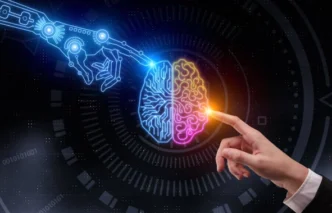How AI is Changing the Game: 75% of Customers Feel the Impact of AI in Customer Service
Imagine walking into a store or visiting a website, and everything—from product recommendations to customer support—is tailored specifically to your needs. That’s the new reality as Artificial Intelligence (AI) takes center stage in customer experience. A study from Palestine’s banking and telecom industries reveals that AI now drives 26.4% of the customer experience, transforming interactions into seamless, personalized journeys. With customer service becoming smarter and faster, brands embracing AI are pulling ahead of their competitors by delivering real-time assistance, personalized offers, and proactive after-sales support.
But it’s not all smooth sailing—while AI improves efficiency, some customers worry that personalized ads might intrude on their privacy. This duality creates new challenges for businesses navigating AI adoption. Let’s dive into the latest findings and explore how AI is revolutionizing customer experience across industries.
The New Wave of AI in Customer Experience: Key Insights
According to research by Abu Daqar and Smoudy, AI has a profound influence on customer service and after-sales support. Here are some of the key findings:
•22.9% of personalized customer service is now powered by AI, with systems offering tailored recommendations throughout the buying journey.
•AI drives 7% of after-sales support services, automating call center operations to reduce waiting times and improve problem resolution.
•75% of customers, according to a survey by InMoment, admit they notice personalized services driven by AI—but some also express concerns about privacy.
•AI helps firms predict customer behavior and offer targeted promotions, directly boosting sales and customer loyalty.
How AI Enhances Customer Experience Across the Buying Journey
AI provides seamless customer experiences by analyzing data at every stage of the buying journey:
1. Awareness Stage:
•AI-powered predictive analytics identify products or services that might interest potential customers.
•Personalized ads target customers with relevant product recommendations, helping them discover new items.
2. Consideration Phase:
•Websites use AI to compare products and display the most relevant information to aid decision-making.
•Virtual assistants engage customers, answering questions and offering additional support.
3. Purchase Phase:
•AI systems detect customers’ unique buying patterns and offer recommendations for complementary products in real time.
•Chatbots streamline the checkout process, guiding users through payment and delivery options.
4. After-Sales Support:
•AI systems monitor customer behavior and identify signs of dissatisfaction, triggering proactive support.
•Virtual assistants provide 24/7 help, resolving issues without human intervention and reducing waiting times.
Real-World Applications of AI: How Businesses are Adopting It
1. Call Centers and Automated Support
Companies in Palestine, such as banks and telecom providers, are implementing AI-driven chatbots to handle routine inquiries. These systems reduce wait times, free up human agents to manage complex cases, and improve response accuracy.
2. Personalized Customer Journeys
By tracking customer interactions, AI systems offer targeted discounts and personalized product suggestions. For example, customers browsing online stores will receive product recommendations based on their browsing history—boosting engagement and conversion rates.
3. After-Sales Customer Support
AI ensures faster troubleshooting and more effective solutions by categorizing customer inquiries into relevant topics. Automated virtual assistants guide customers through installation, maintenance, and usage procedures, improving their overall experience.
Challenges of AI Adoption: Striking a Balance Between Efficiency and Privacy
Despite its benefits, AI adoption faces hurdles. InMoment’s survey indicates that 75% of customers are cautious about highly personalized ads, worrying that they are being “watched” online. Similarly, 34% of consumers feel uneasy about relying on AI for tasks like investment decisions, highlighting the importance of maintaining transparency and trust.
Moreover, cases such as Microsoft’s AI chatbot fiasco—where the bot turned offensive—demonstrate that AI systems must be carefully monitored to avoid damaging customer trust.
How AI Transforms the Public Sector: Beyond Retail and Banking
AI is not limited to private enterprises. The public sector is also leveraging AI to enhance social welfare and public health. For example:
•Public Safety: AI prioritizes emergency response by identifying patients who need immediate care.
•Social Welfare: AI automates routine inquiries, enabling human agents to focus on complex social issues.
•Healthcare: AI predicts the spread of infectious diseases by analyzing patient data across regions, helping governments respond proactively.
AI’s Future Impact on Customer Experience: What Lies Ahead?
The rise of AI is transforming customer service into a key differentiator for businesses. Research shows that 86% of customers are willing to spend more on brands offering superior customer experiences. Here’s what the future holds:
•AI-powered Virtual Assistants will replace a large portion of traditional call centers, providing 24/7 human-like support.
•Predictive AI will detect customer dissatisfaction before it happens, allowing businesses to resolve issues proactively.
•Drones and autonomous delivery systems will enhance logistics, offering faster, more efficient delivery services.
How AI Improves Life for End Users
The use of AI promises a better, more personalized experience for end users. Here’s how it benefits customers directly:
•Faster Resolutions: AI chatbots provide immediate answers to inquiries, eliminating long wait times.
•Tailored Experiences: Personalized recommendations make shopping easier, helping customers find what they need faster.
•24/7 Support: AI-driven virtual assistants ensure round-the-clock customer service without interruptions.
•Proactive Assistance: AI predicts when products might need maintenance or updates, alerting customers in advance.
Conclusion: AI is the Future of Customer Experience
The adoption of AI in customer experience is no longer optional—it’s a necessity for businesses aiming to remain competitive. Companies that integrate AI across the customer journey are witnessing improved customer satisfaction, higher sales, and greater loyalty. With AI poised to handle 85% of customer interactions by 2025, businesses that act now will have a significant edge over their competitors.
The future of customer experience lies in seamless AI integration—where technology works silently in the background, creating personalized, proactive, and effortless interactions for every customer.
This revolution in customer service is just the beginning. As AI systems continue to evolve, businesses will unlock new ways to engage customers, turning every interaction into an opportunity to build lasting loyalty and satisfaction.











